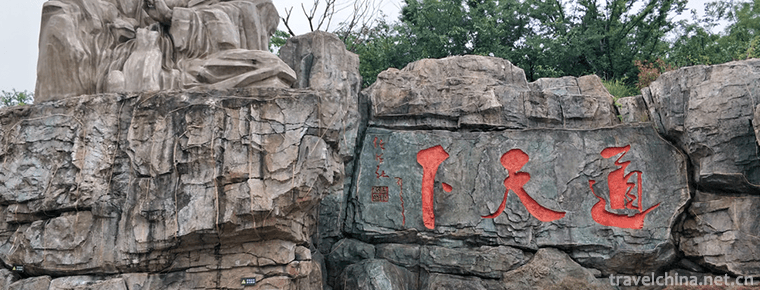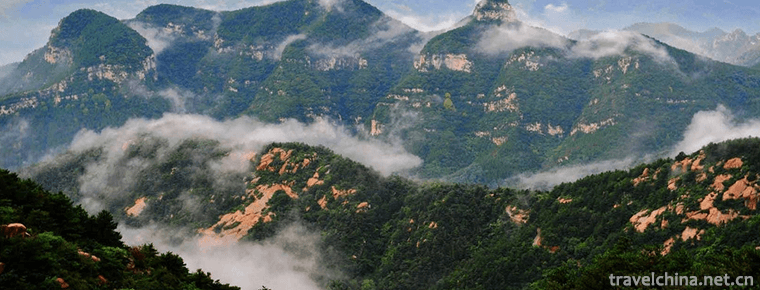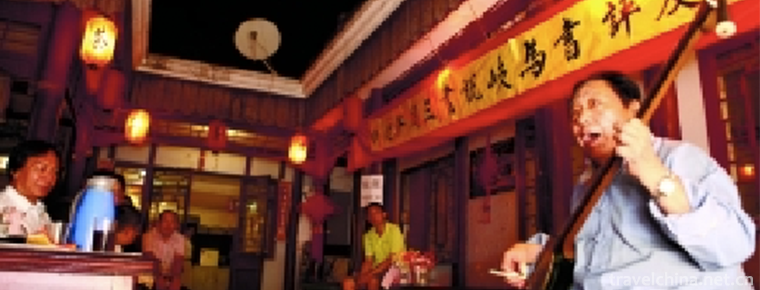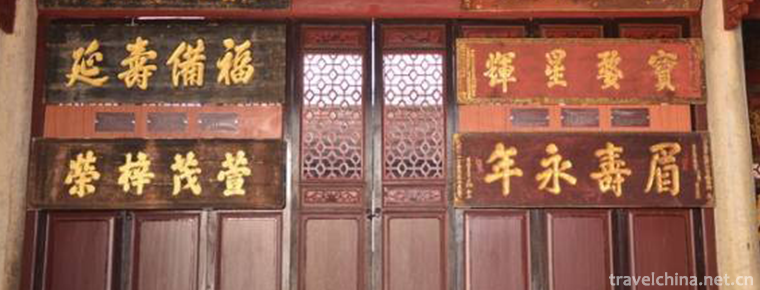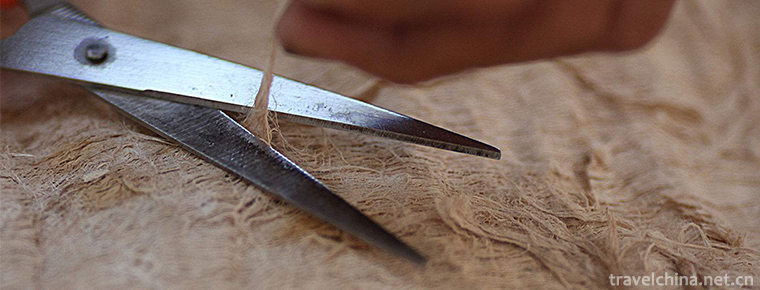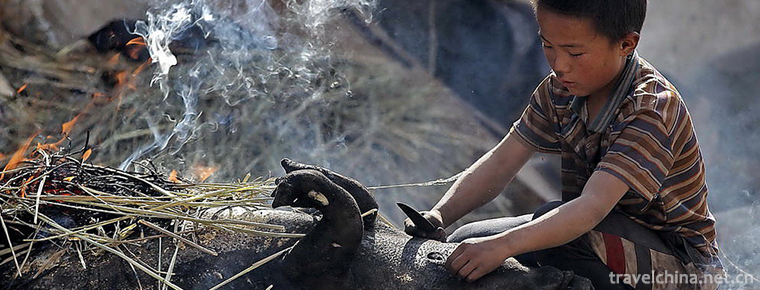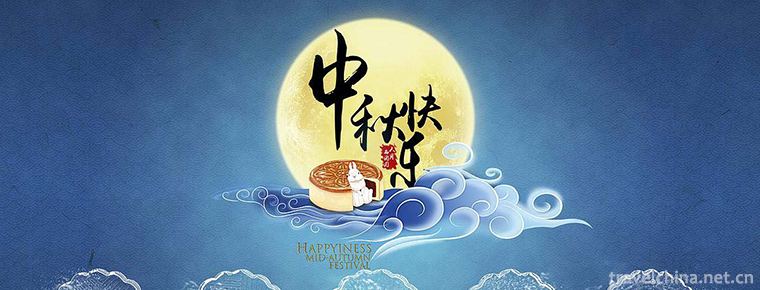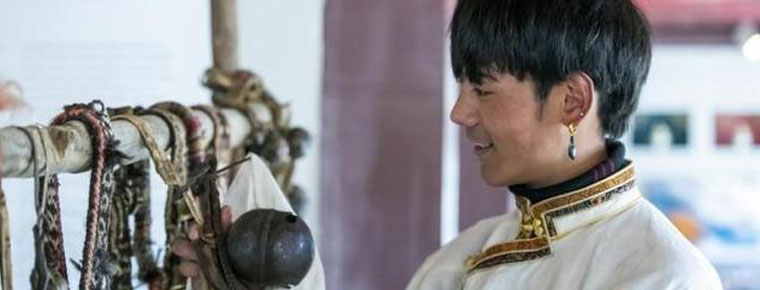Legend of Ronke Mountain
Legend of Ronke Mountain
The legend of Mount Ronke is a local folklore spread in Quzhou, Zhejiang Province. Weiqi originated in China, and it is said that the root of Weiqi is Mount Ronke.
According to Duo Daoyuan of the Northern Wei Dynasty, a woodcutter named Wang Quan went to Shishi Mountain to cut firewood during the Jin Dynasty, and when he saw two boys playing Go, he sat aside and watched. At the end of the game, the boy said to him, "Your axe handle is rotten." It took Wang Qiao decades to return to the village. Therefore, later generations called Shishishan Ronke Mountain, and used "Ronke" as a nickname for Go. So far, the word "Ronke" is still common in chess magazines at home and abroad. Japanese high-ranking chess players often use the word "rotten Ke" in fans to give gifts to relatives and friends. Some classical game scores of Go in our country are also titled according to "Ronke".
On May 23, 2011, the legend of Ronke Mountain was approved by the State Council to be included in the third batch of national intangible cultural heritage list.
Essential information
The reason why Langke Mountain in Zhejiang Province is famous at home and abroad is closely related to its long history. Legend has it that in Yanhuang period, the rainmaster of Yandi at that time, Pinus chinensis and his little daughter, Shaojiang, practiced in the chamber stone. In the Spring and Autumn Period, it was called Shishishan, Kongshishan and Kongdong Mountain, and it was a great resort of Gumi Country. In the mid-Jin Dynasty, the story of the emperor's encounter with immortals and rotten Ke was widely circulated all over the world, and its fame spread far and wide. In the Northern Wei Dynasty, it was called Suspension Chamber Ban, and in the early Tang Dynasty, it was called Shiqiaoshan. In the early years of the Yuan Dynasty (about 806), this mountain was first called the Lanke Mountain.
Ren Zheng of Liang Dynasty wrote in the book Shuyi Ji: "Shishi Mountain, Xin'an County. In the Jin Dynasty, Wang Shizhi felled trees and sang at the sight of children's chess. Boys and things and qualities, such as jujube nuclei, are not hungry. The Russian hectare boy said, "Why not go?" Hold your eyes, axe and axe are exhausted, both return, no return. Lanke Mountain is named after it.
Du Guangting of Tang Dynasty called it "the Eighth Hole of Qingxia". There is a slit on the cave, 10 meters long, wide in the South and narrow in the north. Only one person can creep in the middle. From the slit, a slit of blue sky can be seen, so it is called "a line of sky". The original eight sceneries of the Ronke Mountain are Shiliang, Qingxia Cave, Yitian, Jinjing Yutian, Xianren Chess, Richiting, Keshan Pagoda and Baoyan Temple. In addition, there are also scenic spots such as Zhongzhuang Mausoleum, Meiyan, Chisongyan, Jixian View, Chongwendong, Qiaoyin Rock and so on.
Content introduction
Legend has it that long ago, there was a village under the Ronke Mountains. There lived a hard-working and kind-hearted man in the village. Because he lived by chopping firewood, people called him Wang Qiao. One day this spring, Wang Qiao picked up a pole axe and went up the hill to cut firewood. Walking up to the mountain, I saw two white-haired and long-bearded old men, who joined hands in the Peach Blossom Cave of Ronke Mountain. Wang Qiao was surprised that he had not seen the two old men in the village. Out of curiosity, he followed them into the cave. See only the drifting water in the cave, the peach blossoms on both sides are bright red, some trees have been fruitful. The two old men sat down on both sides of a bluestone, laid out the chessboard and played chess. When Wang Qiao saw this, he put down his pole, put down his firewood axe and squatted down to watch chess. Over a long period of time, I saw two old people. Sometimes they picked a peach and ate it. Sometimes they gave it to Wang Qiao. I don't know how long it took for the two old men to finish playing chess and get up and go deep into the cave. Then Wang Qiao remembered that he had come to chop firewood. He hurried to pick up the pole. The pole was rotten. Then he went to pick up the wood axe and the axe handle was rotten. The firewood could not be cut, so we had to go out of the hole along the original road and go home. Once out of the hole, he felt that the previous mountain trees and roads had changed, and the way back could only be dimly identified. At last, when he arrived at the village, all the villagers were strangers. He asked Wang Qiao's family in surprise. People told him that Wang Qiao had gone up the mountain to collect firewood and never returned. It had been 800 years since then. Only then did Wang Qiao realize that he had met a fairy and that he had become a fairy himself. Knowing that it was useless to search further, he had to return to the mountains and enter the Peach Blossom Cave, and then he did not know what to do.
Legend of Ronke Mountain
One of the legends
The legend of Ronke Mountain originated from the story of the woodcutter king of Jin Dynasty who went up to the mountain to watch Chess Ronke. Legend has it that in the mid-Jin Dynasty, there was a woodcutter named Wang Shi, who lived near Taibaijing in Qucheng. His mother and younger brother lived there. He often chopped firewood in a mountain southeast of Qucheng. The forest was dense and there was a huge stone sorghum in the mountain. It was also named Shishishan Mountain, which was similar to the stone chamber. One day, Wang Shi went to the Shishi Mountain to cut firewood. He met two boys (actually fairies) playing chess under Shiliang. Wang Shi watched a chess game. The axe handle of wood cutting had rotted and the time had passed for hundreds of years. When he returned home, his family no longer existed. Wang Shi returned to Shishi Mountain and became Tao Cheng Xian, so Ronke Mountain got its name.
Similar legends are widely circulated, such as Wuxiang County of Shanxi Province, Gaoyao County of Guangdong Province, Luochuan County of Shaanxi Province, Lingchuan County of Shanxi Province, Xin'an of Henan Province, Xichang of Sichuan Province, Dazhou, Nanping of Fujian Province and Yuxian County of Jiangsu Province, as well as Chun'an, Tiantai Shaoxing of Zhejiang Province, Chengdu Langchaishan Mountain, Cheishan Mountain of Laiwu of Shandong Province and Yixiantai Mountain of Fujian Province. 。
The earliest written record of the legend of Lankeshan is Yuxi's Zhilin in the mid-Jin Dynasty (345-356 A.D.). Later, in the period of Emperor Xiaowen of the Northern Wei Dynasty (471-476 A.D.), there were records in many historical disciplines, such as Yan Daoyuan's Annotation of Shuijing, Liang Wudi of the Southern Dynasty (504-549 A.D.) Ren The word "Ronke Hill" has been included in such famous dictionaries as the Concise Encyclopedia of Britain, the Source of Words, the Cihai and the Chinese Dictionary of Geographical Names. Due to the impact of modern life, the legend of Lanke Mountain is only spread among the few tour guides in the tourism industry. What people can talk about is only some old people. At the same time, many landscapes and relics related to this legend have been seriously destroyed due to war and other reasons, such as "Jixian Guan", "Yuzhixianyin", "the highest top" and so on. There are many cliff inscriptions under the natural stone beams, and now only the four words "Tianshengshiliang" written by Li Sui of the Ming Dynasty are left in many ancient inscriptions. There are only remnants of Xuwei's poetry tablets in the Ming Dynasty and Kuo Pu's "Diary of the Late Pavilion" in the Ming Dynasty. The stele, the "Warring Dragon Pine Relics" and the "Wuzhi Cinnamomum Relics" of the Republic of China are few and far between.
The legend of Ronke Mountain is a special product of specific historical conditions, specific environment and time. Therefore, it first possesses the value of national folklore. Its strong national cultural color is one of the representative "two sons" cultures in Quzhou. Secondly, it has tourism value, such as the name of Quzhou ancient city "Kecheng", the name of "Shishi Town" and "Shiliang Town" in Kecheng District are derived from the legend of Ronke Mountain, and the name of "Tongxianmen" in ancient city gate and "Xianyou Ferry" in Shishishishi Mountain are also derived from the legend of Ronke Mountain. The value of cultural exchange, in recent years, because of the introduction of the Ronke Mountain Weiqi events greatly improved the popularity of Quzhou, and promoted the development of Quzhou economy. It can be said that the influence of the Ronke Mountain culture in Quzhou and even the whole country is very far-reaching. (Source: Non-material Cultural Heritage Protection Center of Zhejiang Mass Art Museum)
Legend two
Ronke Mountain is located in Shibao Township, 15 kilometers away from Quzhou City, western Zhejiang Province. It is also known as Shishishi Mountain and Shiqiao Mountain. Ko, referring to the wooden handle of the axe, originated from an ancient legend.
According to the County Chronicle of the Republic of China, there was a woodcutter named Wang Quan in the Jin Dynasty. One day, he went up the mountain to cut firewood and went into a stone room. When he saw two old people sitting inside playing Go, he stepped forward to watch it. The old man gave him something like a jujube nucleus, so that he would not feel hungry and thirsty if it was contained in his mouth. Before the end of the game, Wang looked back and found that the axe handle for firewood cutting was rotten. Wang Quan hurried down the hill to go home. Who knows that the family is totally different, the original father and fellow countrymen are no longer alive. Once inquired, it has lasted for two generations, and since then there has been the saying of "rotten Keqi root". But according to Jin Yuxi's Zhilin, the chess players Wang Jing watched in the stone room were not two old people, but two young children.
There is also a legend, seen in the book of Notes to the Water Classic written by Yun Daoyuan, that working substances are felled into stone chambers, not to watch children play chess, but to listen to four children playing piano and singing, people forget to return. As a result, the handle of the axe was rotten.
In short, this is a very old legend about Qiaoren entering the mountains and watching immortals against Yiren. The plot of the end of the axe handle has been widely circulated. It is not uncommon in all parts of the country to claim to be the ruins of the Lankeshan Mountain. But Lunke Mountain in Quzhou is the only Taoist book in China that has been classified as "Dong Tianfu Tian" and "Qingxia Eighth Dong Tian". The so-called "cave heaven and earth" refers to the famous mountain scenic spot where the immortals live in Taoist legends. Du Guangting of the Tang Dynasty recorded in his book Dong Tian Fu Di Yue Ye Ming Shan Ji that there were "ten cave heavens", "thirty-six small cave heavens" and "seventy-two happy places" in the whole country. So it is universally acknowledged that Quzhou is not only the birthplace of Ronke Mountain, but also the root of Chinese Go. The allusion of "Ronke" has been widely spread in chess circles for a long time.
About the legend of Ronke Mountain, the records in the ancient books are relatively simple, and the folklore spread in the local area is detailed, vivid and fascinating. Legend has it that there was a family in Quzhou Prefecture a long time ago. There were three members of the family, a blind mother, grandchildren and grandchildren. Because of his poor family, he reluctantly maintained his livelihood by cutting firewood on the mountain by his grandson. One day, two passers-by passed by Wang Zhijia's door. They were hungry so much that they borrowed cooking stoves from Mammy Blind. However, Wang Ji did not return from firewood cutting and there was no firewood in his family. Passers-by guests did not care, one of them simply put his leg into the stove for firewood. They cooked a pot of noodles, ate a bowl of noodles, left a bowl as a reward, and left. When Wang came back from cutting firewood, he saw a big bowl of noodles on the table and took them up and ate them. He had never eaten such delicious noodles before and asked Mammy where she had got them. Mammy said the whole thing one hundred and fifty times. Wang Shi was surprised to hear that, then he suddenly found his own table, bench legs were burnt, instantly angry, grabbed an axe and chased out. I went all the way up to a mountain in the south of the city, but there was no trace of it. I saw two people playing chess in the cave. Wang Jun was a chess fan. Seeing that the two men were working hard, he laid a cushion on the ground with an axe handle and sat down to watch the chess. The two men ate peaches while playing chess. They also broke off half of the peaches and handed them to Wang Quan. Wang Quan ate while watching. Before he finished eating, the peach stones thrown on the ground had sprouted and grown into peach trees. At this time, the two old men reminded him, "Don't go back, look at your axe handle is rotten." Wang Jing looked down and was shocked. He hurried down the hill to go home, but the way home changed. As he walked, he asked, but he could not find his home in the city. When he asked the neighbors in the neighborhood, he realized that Mammy had passed away for hundreds of years and that the beard of the descendants had turned white. Wang Quan sighed and said, "One day in the mountains, thousands of years in the world!" Legend has it that the two people who cook noodles and play chess are Tieguai Li and Lu Dongbin. Since then, people have called this mountain Ronke Mountain. (Source: Red Net)
Main characteristics
Because of its own characteristics, the legend of Ronke Mountain has the basic characteristics of folklore. Its language is simple and concise, its content is rich and beautiful. It embodies the struggle of the working people against nature and life and their desire for survival.
Main value
I. Literary Value
As an important part of Luochuan folk literature, the legend of Ronke Mountain has high literary value. Through this legend, we can further understand the linguistic features and expressive techniques of folk legends.
II. Historical Value
Legends often reflect the needs and lives of people in a social period, through the legends of Mount Ronke and the existing relics of Mount Ronke. Investigation and research can help us understand the social situation at that time.
historical origin
The legend of Wang Qiao's encounter with immortals in Guanqi was first recorded in Shuyiji and Shuijing Zhu.
Related articles
Peach blossom cave and small stone cave, chessboard, statue and so on.

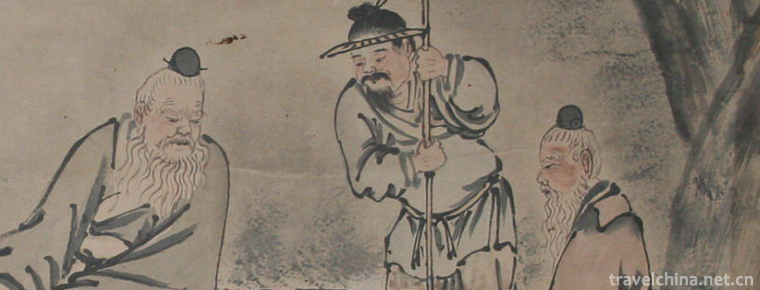
-
Zhengzhou Xiao Ji stewed noodles
Zhengzhou Xiao Ji stewed noodles,Xiao Honghe, the founder of Xiao Ji Yanmian, was a master of Yifumian at Changchun State-owned Hotel in Zhengzhou. .
Views: 177 Time 2018-11-26 -
Mount Maoshan
Maoshan is located in Jurong City, Zhenjiang City, Jiangsu Province. It is about 10 kilometers long from north to south, 5 kilometers wide from east to west, and covers an area of more than 50 square .
Views: 184 Time 2018-12-06 -
Yimeng Mountain Range
Yimeng Mountain Tourist Area is a cross-regional tourism area consisting of the geographical coordinates of Mengshan and Yishan Mountains according to the local tourism department of Shandong Province.
Views: 118 Time 2018-12-08 -
West Mountain Scenic Spot of Guiping
Guiping Xishan Scenic Spot, National AAAA Scenic Spot, National Geopark. Located in Guiping City, southeastern Guangxi Zhuang Autonomous Region, Xishan Scenic Spots 1 km away from the outskirts of the.
Views: 117 Time 2019-01-13 -
Beijing storytelling
Beijing Book Review is a traditional art of rap and singing. Legend has it that Liu Jingting (1587-1668), a Southern Jiangnan storyteller, came to Beijing in the late Ming and early Qing Dynasties.
Views: 452 Time 2019-04-04 -
Plaque Custom Hakka Plaque Custom in South Jiangxi
Hakka plaque custom in southern Jiangxi has gradually developed with the migration of northern scholars to southern Jiangxi. Hakka traditional custom in rural areas has been formed.
Views: 142 Time 2019-04-04 -
Production Techniques of Bark Cloth of Li Nationality
Li bark cloth production technology is based on the bark of plants as raw materials, after beating technology to produce cloth technology..
Views: 90 Time 2019-05-12 -
Year of the Yi Nationality
In the year of the Yi people, the Yi language is called "Kusi", "Ku" is the year of the Yi people and "Si" is the new year. It means "New Year". It is a traditi.
Views: 210 Time 2019-07-12 -
Mid Autumn Festival
Mid-Autumn Festival, also known as Moon Eve, Autumn Festival, Mid-Autumn Festival, August Festival, August Meeting, Moon Pursuit Festival, Playing Moon Festival, Moonworship Festival, Daughter's Festi.
Views: 130 Time 2019-08-03 -
Qixian Lake
Qixian lake water resort is located in Fuxing Town, Gaoxian County, more than 40 kilometers away from Yibin City. It is the largest mountain water storage Lake in Yibin City, with a water area of 2632 Mu and a total area of more than 50 square kilometers. It was listed as a regional scenic spot in 1988 and approved as the first batch of provincial wetland park by Sichuan Provincial People's Government in 2008..
Views: 370 Time 2020-10-16 -
Ding Zhen becomes popular and half moon looks haggard
Ding Zhen became popular half moon, haggard face, eyes full of bloodshot, confessed that he liked riding and herding cattle most.
Views: 100 Time 2020-12-07 -
Guangyuan climate
Guangyuan City belongs to subtropical humid monsoon climate; it is located in the southern foot of Qinling Mountains, which is a transition zone between North and south. It has the characteristics of humid climate in the South and the characteristics of high sky.
Views: 329 Time 2020-12-15

